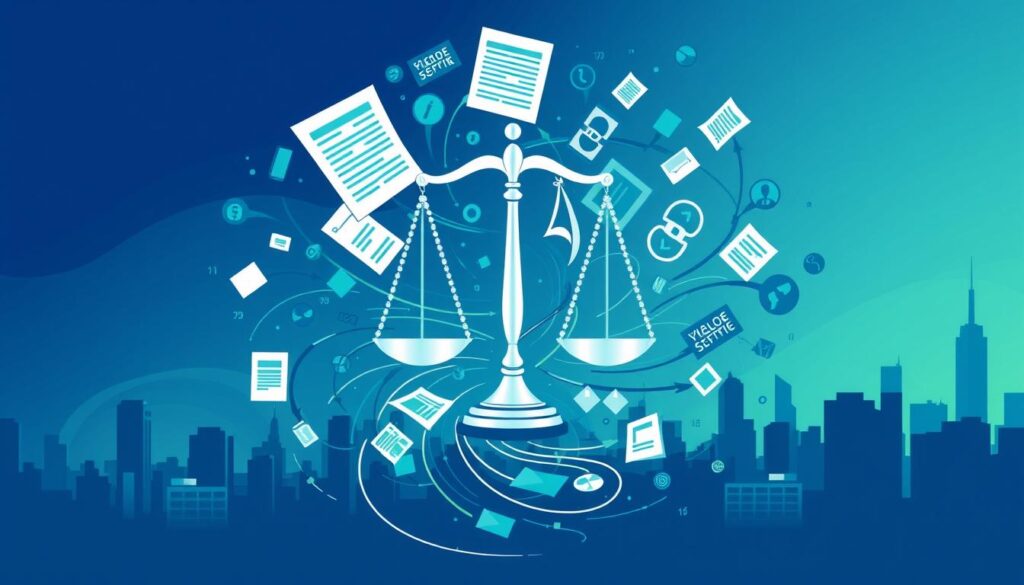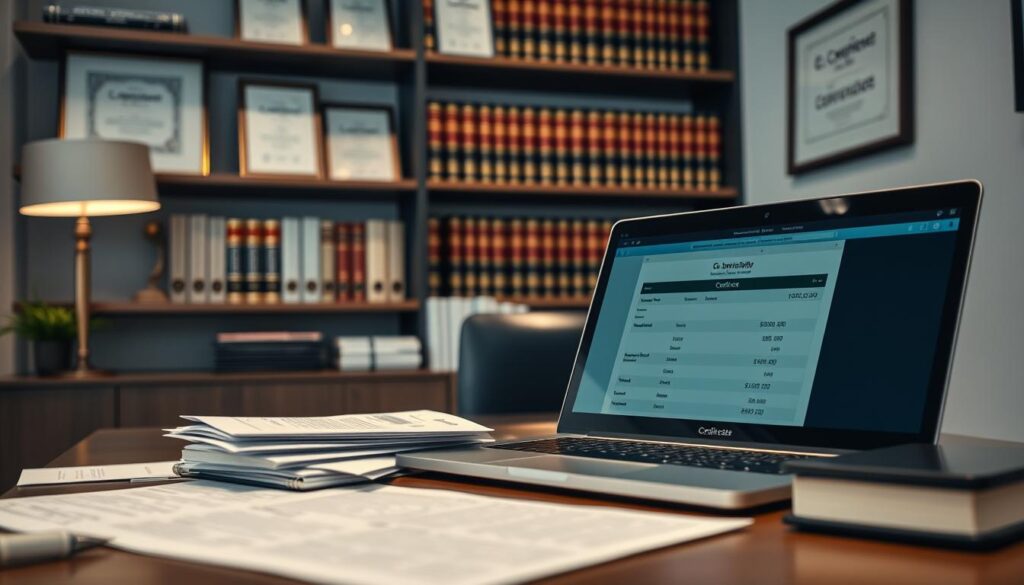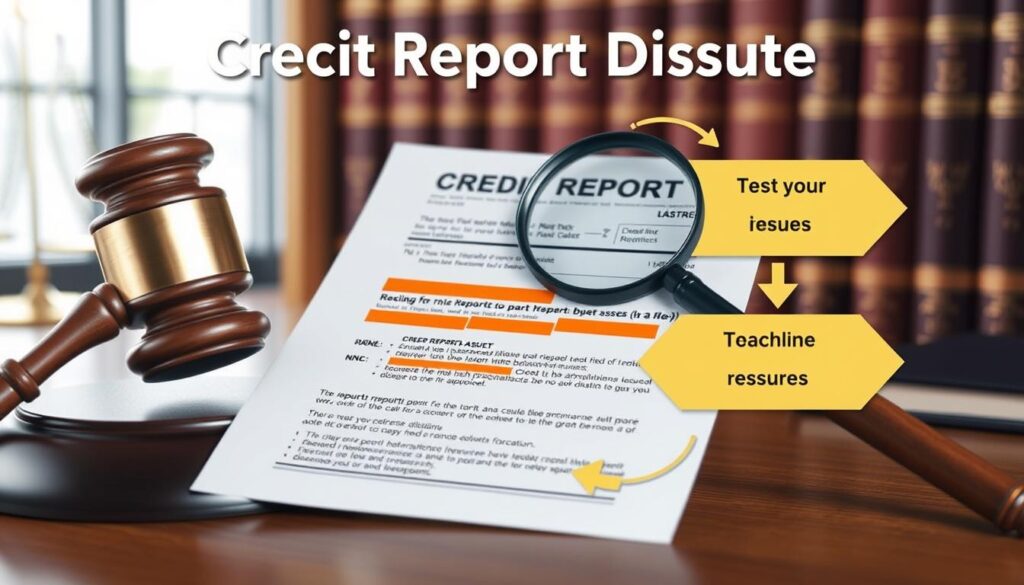Here’s the rewritten content for the paragraph enclosed in p tags:
Negative information on your credit report can be frustrating and overwhelming. A skilled lawyer can help you navigate this complex process. They can dispute errors, address inaccuracies, and hold credit bureaus accountable under the Fair Credit Reporting Act.
This article provides information and resources to help you make informed decisions. You’ll learn how to get legal assistance to protect your financial well-being. With the right support, you can tackle credit report issues effectively.
Understanding the Importance of Accurate Credit Reports
Your credit report is crucial for your financial life. It helps lenders, landlords, and employers assess your creditworthiness. Wrong or negative info on your credit report can cause unfair denials and higher interest rates.
The Impact of Credit Reports on Your Financial Life
Your credit report shows your financial history, including payment patterns and debt management. It affects your ability to get loans, rent homes, or find jobs.
A good credit report is key to reaching your money goals. Keep it accurate and positive for the best results.
Common Credit Report Errors and Their Consequences
- Identity theft: Fake accounts can hurt your credit score and finances.
- Incorrect account information: Wrong details about your accounts can misrepresent your creditworthiness.
- Outdated or unverified data: Old info may not show your current finances accurately.
These credit report errors can lead to credit denials and higher interest rates. They might even cost you job opportunities.
Address these issues quickly using the fair credit reporting act. Consumer credit protection helps maintain a healthy financial profile.
Inaccurate credit reports can have a devastating impact on an individual’s financial life, leading to unfair denials, higher costs, and lost opportunities.
Your Rights Under the Fair Credit Reporting Act
The Fair Credit Reporting Act (FCRA) protects consumers’ credit information. This law ensures fair and accurate handling of credit reports by credit bureaus and other companies.
The FCRA grants you several important rights. These rights help you manage your credit information effectively.
Under the FCRA, you have the following key rights:
- The right to access your credit report for free from each of the three major credit bureaus (Experian, Equifax, and TransUnion) once per year.
- The right to dispute any inaccurate or incomplete information on your credit report, and have it investigated and corrected by the credit bureaus.
- The right to be notified when information in your credit report has been used against you in a credit decision, such as being denied a loan or credit card.
- The right to have negative information removed from your credit report after a certain period of time, typically 7-10 years.
- The right to be informed if information in your credit report has been used to take adverse action against you, such as denying your application for credit, insurance, or employment.
These consumer credit protection rights safeguard individuals from inaccurate credit information. They help maintain a healthy financial profile and avoid potential credit-related issues.
Knowing and using these rights is vital for your financial well-being. The fair credit reporting act empowers you to control your credit information.
“The FCRA is a powerful tool that empowers consumers to take control of their credit information and protect their financial well-being.”

When to Seek Legal Help from a Negative Credit Report Information Lawyer
Credit report issues can be complex and overwhelming. A negative credit report information lawyer can help you address these problems. Certain signs indicate when professional help is needed.
Signs That You Need Professional Assistance
- You’ve been unable to resolve errors on your credit report on your own, despite repeated attempts.
- You’re facing legal threats or harassment from creditors due to credit report issues.
- You’ve experienced significant financial hardship or damage to your credit score as a result of credit report errors.
- You’re unsure of your rights under the Fair Credit Reporting Act (FCRA) and how to effectively exercise them.
The Benefits of Hiring a Credit Report Attorney
A credit repair attorney specializing in credit report information offers many advantages. They can help you tackle credit report problems effectively.
- Expertise in FCRA laws: A credit report attorney has a deep understanding of the FCRA and can ensure your rights are protected.
- Effective dispute process: They can effectively navigate the credit report dispute process and negotiate with creditors and credit bureaus on your behalf.
- Potential for damages: If your rights have been violated, a credit repair services attorney may be able to help you recover monetary damages.
A negative credit report information lawyer can help protect your financial health. They can address credit report errors and guide you through the process.

Choosing the Right Negative Credit Report Information Lawyer
Finding a qualified negative credit report information lawyer is crucial for your credit report dispute. This guide will help you select the best legal representation. We’ll cover key factors to consider during your search.
Qualifications and Experience to Look For
Evaluate the lawyer’s expertise in the Fair Credit Reporting Act (FCRA). Check their success rate in credit report dispute resolution. Look for attorneys with a strong understanding of FCRA laws.
Seek lawyers who have successfully represented clients against credit bureaus and creditors. Their experience in legal proceedings is vital. A proven track record increases your chances of a favorable outcome.
- Expertise in FCRA laws and regulations
- Successful track record of credit report dispute resolution
- Experience in legal proceedings against credit bureaus and creditors
Consider the credit repair attorney’s communication skills. They should explain complex legal matters clearly. This ensures you understand the strategies for addressing negative information on your credit report.
A good negative credit report information lawyer will not only have the legal expertise but also the ability to guide you through the process and keep you informed every step of the way.
Carefully evaluate potential lawyers’ qualifications and experience. This increases your chances of finding the right legal partner. A skilled attorney can help you overcome challenges with inaccurate credit report information.

The Credit Report Dispute Process with an Attorney
Dealing with credit report issues can be tough. A negative credit report information lawyer can help. They’ll guide you through fixing errors in your credit report.
Your attorney will start by gathering evidence. This includes credit reports and proof of errors. They’ll review everything to build a strong case.
Your lawyer will then submit formal disputes to credit bureaus. They’ll make sure all needed info is included. During the investigation, they’ll keep track of progress.
- Submission of Formal Disputes: Your attorney will then assist you in submitting formal disputes to the credit bureaus, ensuring that all necessary information and documentation is provided to support your claim.
- Monitoring the Investigation: Throughout the investigation process, your lawyer will closely monitor the progress and advocate on your behalf to ensure a timely and satisfactory resolution.
- Verification of Dispute Resolution: Once the credit bureaus have completed their investigation, your attorney will review the results and verify that the credit report errors have been properly corrected.
A lawyer can boost your chances of success. They know the Fair Credit Reporting Act inside out. Their expertise protects your consumer rights.
With legal help, you can face the dispute process confidently. Your attorney will fight for the best outcome. They’ll make sure credit bureaus fix any errors.
| Step | Description |
|---|---|
| Gather Evidence | Collect copies of your credit reports, documentation of errors, and communication with credit bureaus or creditors. |
| Submit Formal Disputes | Your attorney will assist in submitting formal disputes to the credit bureaus, ensuring all necessary information is provided. |
| Monitor Investigation | Your lawyer will closely track the investigation process and advocate on your behalf to ensure a timely and satisfactory resolution. |
| Verify Resolution | Once the investigation is complete, your attorney will review the results and confirm that the credit report errors have been corrected. |
A skilled lawyer can guide you through credit report disputes. They’ll protect your rights under the Fair Credit Reporting Act. With their help, you’re more likely to get a good result.

Holding Credit Bureaus Accountable for Inaccuracies
Credit bureaus must investigate and fix errors on your credit report. If they don’t, you can take legal action. The Fair Credit Reporting Act (FCRA) protects consumers and holds credit bureaus accountable.
Legal Remedies for Credit Report Errors
The FCRA allows you to seek legal remedies if credit bureaus neglect their duties. You can recover damages for willful or negligent violations.
Courts can order credit bureaus to investigate and correct errors. You may also recover attorney’s fees and court costs related to your legal action.
- Recovering damages for willful or negligent violations of the FCRA
- Obtaining a court order to force the credit bureaus to investigate and correct errors
- Recovering attorney’s fees and court costs related to your legal action
A negative credit report information lawyer can help you navigate the FCRA. They ensure your consumer credit protection rights are upheld.
“Inaccurate credit reports can have devastating consequences on a person’s financial well-being. It’s essential that consumers have the ability to hold credit bureaus accountable for their failures.”
Understanding your FCRA rights is crucial. Working with a skilled lawyer helps address credit report errors. This protects your financial future.
Protecting Your Consumer Rights with a Credit Repair Attorney
A credit repair attorney can help you tackle credit report inaccuracies. They’re experts in the Fair Credit Reporting Act (FCRA). This law protects you from unfair credit reporting practices.
With a skilled attorney, you can use FCRA protections to your advantage. They’ll guide you through the complex world of consumer rights.
Understanding the Fair Credit Reporting Act
The FCRA sets rules for credit reporting agencies, creditors, and consumers. A credit repair attorney can explain its key parts to you.
- The right to dispute inaccurate or incomplete information on your credit report
- The requirement for credit bureaus to investigate and correct any errors found on your report
- The ability to seek damages from credit bureaus or creditors for willful or negligent noncompliance with the FCRA
- Limitations on the types of information that can be included in a credit report
A credit repair attorney ensures your consumer credit protection rights are respected. They make sure all credit repair efforts follow FCRA rules.
“A credit repair attorney can be your best ally in navigating the complexities of the Fair Credit Reporting Act and protecting your consumer rights.”
| FCRA Provision | Explanation |
|---|---|
| Right to Dispute Inaccuracies | Consumers have the right to dispute any inaccurate or incomplete information on their credit reports with the credit bureaus. |
| Credit Bureau Investigation | Credit bureaus are required to investigate and correct any errors found on a consumer’s credit report. |
| Damages for Noncompliance | Consumers can seek damages from credit bureaus or creditors for willful or negligent noncompliance with the FCRA. |
The Role of a Negative Credit Report Information Lawyer in Credit Repair
A negative credit report information lawyer can be your ally in credit repair. These experts navigate credit reporting complexities and tackle inaccuracies on your credit report. Their skills help address negative items affecting your financial standing.
Teaming up with a credit report attorney protects your financial health. They dispute errors with credit bureaus and negotiate with creditors. These professionals craft tailored strategies to improve your credit profile.
A credit repair services attorney empowers you to shape your financial future. Their guidance helps boost your credit score. This improvement opens doors to better loans, mortgages, and job opportunities.

